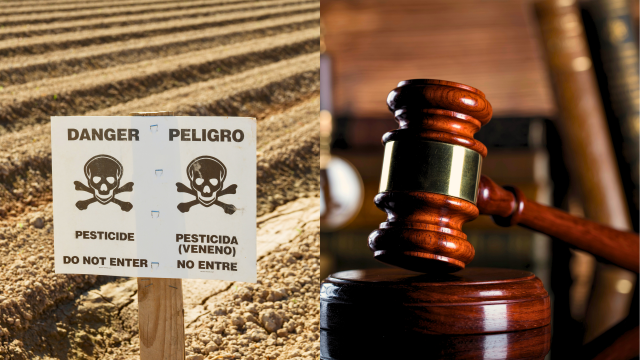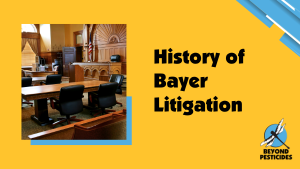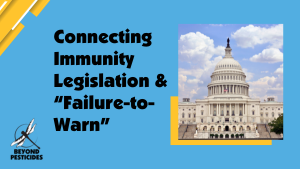01
Apr
Multi-Billion Verdict Against Bayer/Monsanto in GA as Legal Rights Under Attack in the State and Nationwide

(Beyond Pesticides, April 1, 2025) With the second largest award of nearly $2.1 billion (see reporting on largest), a jury in Georgia state court on March 21 found the pesticide manufacturer Bayer/Monsanto guilty of causing a man’s non-Hodgkin’s lymphoma after use of the company’s glyphosate-based weedkiller RoundupTM product. The jury’s award includes $65 million in compensatory and $2 billion in punitive damages, as reported by the Associated Press and Courtroom View Network.
This verdict in Barnes v. Monsanto (2025) comes amid a concerted effort by Bayer and other chemical and agribusiness groups to take away the main legal argument, “failure-to-warn,” for the type of litigation that pesticide exposure victims have commonly used to hold companies accountable. This is happening as Governor Brian Kemp of Georgia considers signing into state law a pesticide immunity bill that will prevent future litigation like this in the state. In a deregulatory environment, the courts and state governments are viewed as critical backstops, given the dismantling of the U.S. Environmental Protection Agency’s (EPA) regulatory apparatus and extremely limited Congressional oversight.
History of Litigation

Bayer has lost almost all of the cases filed against it for compensation and punitive damages associated with the plaintiffs’ charge that its products caused them harm. The U.S. Supreme Court twice rebuffed the company’s plea to have its appeal heard, as reported by Beyond Pesticides and news outlets. Its legal strategy, pursued through the entire court system, has failed to fend off ongoing litigation for harm associated with its glyphosate-based products. As Bayer’s website has touted in a five-point strategy to mitigate the company’s financial “risks” from future litigation, “A favorable ruling by the U.S. Supreme Court on the federal preemption question could largely end the Roundup litigation.” The main question here is whether state-based “failure-to-warn” claims are preempted by federal law since the EPA concluded glyphosate does not cause cancer and approved the Roundup™ label without a warning. Bayer is vigorously pursuing a judicial decision or the adoption of legislation at the federal or state level that preempts, or takes away, plaintiffs’ right to sue the company when they are harmed by the company’s products.
Bayer is not giving up on the current U.S. Supreme Court in seeking to overturn current law, as established by previous court decisions, including Bates v Dow (2005). However, that strategy is not succeeding, at least not yet. The string of Bayer losses includes a judication decision on February 5, 2024, when the decision by the Eleventh Circuit Court of Appeals came down in favor of the plaintiff in Carson v. Monsanto on Bayer’s claim that FIFRA preempts a “failure-to-warn” claim. (See Daily News here for further analysis.)
There were several other significant developments in 2024, including the Oregon Court of Appeals decision on July 10, ruling that the Federal Insecticide, Fungicide, and Rodenticide Act (FIFRA) does not preempt pesticide exposure victims’ claims in state court against pesticide manufacturers, based on reporting from The New Lede. An Appellate court overturned a 2022 local court ruling and remanded the case (for a retrial) in part because the judge had failed to consider the expert witness testimony of Chuck Benbrook, PhD, a scientist specializing in agricultural economics with over 40 peer-reviewed articles, reports, and book chapters on pesticide regulation and risk assessment. (See Daily News here.)
Bayer has doubled down on the safety of its weedkiller, even though investors are sounding the alarm and as the company announced that it could pull Roundup from the U.S. market due to ongoing legal risks. For an in-depth history and related developments for Bayer-Monsanto litigation, see this tracker developed by the Lawsuit Information Center.
Connection to “Failure-to-Warn”
 State legislation to quash lawsuits against chemical manufacturers because of their “failure to warn” about the hazards of their pesticide products is moving forward in six state legislatures (Iowa, Missouri, Idaho, Florida, Tennessee, and North Dakota).
State legislation to quash lawsuits against chemical manufacturers because of their “failure to warn” about the hazards of their pesticide products is moving forward in six state legislatures (Iowa, Missouri, Idaho, Florida, Tennessee, and North Dakota).
Four bills have failed to pass (Mississippi, Wyoming, Montana, and Oklahoma). See a recent Daily News, Flying Through States, Industry Seeks To Stop Lawsuits Over Failure to Warn of Pesticide Dangers, for a legislative update of where the bills stand as of March 31, 2025.
Meanwhile, in August 2024, the Republican Attorney General of North Dakota jointly filed a petition to EPA with 10 other Republican Attorneys General (Alabama, Arkansas, Georgia, Indiana, Iowa, Louisiana, Montana, Nebraska, South Carolina, and South Dakota) requesting that the agency promulgate rulemaking to prevent states like California from adding additional warning labels to pesticide and chemical products that disclose more hazard information than is required on warning labels under federal pesticide law. The proposed petition would prompt the agency to “modify its requirements such that any state labeling requirements inconsistent with EPA’s findings and conclusions from its human health risk assessment on human health effects, such as a pesticide’s likelihood to cause cancer, birth defects, or reproductive harm, [would] constitute misbranding.” This rule would consider any add-on label requirement that considers scientific literature not recognized by EPA (such as the 2015 International Agency for Research on Cancer (IARC) designation of glyphosate as a “probably carcinogenic to humans”) in violation of FIFRA’s misbranding clause. If finalized into regulations, this petition would preempt the ability of states like California to continue its add-on cancer warning label language for products under its state law, Proposition 65 (Safe Drinking Water and Toxic Enforcement Act of 1986).
See the Action of the Week, As Fed Cuts Protections, Petition Would Prohibit State Pesticide Warnings and Restrictions, for an archive of the EPA public comment docket for the proposed petition. Beyond Pesticides will continue to provide updates as information becomes available.
Language establishing chemical company immunity from “failure-to-warn” litigation and local and state authority to restrict pesticides more stringently than EPA is included in the 2024 Republican Farm Bill draft, escalating the fight over federal preemption of state and local standards and protective authority of the courts. The Senate GOP framework alludes to preemption of state and local governance of pesticides, food systems and production, and public health in Title X, Horticulture title: “Restates and reaffirms U.S. Environmental Protection Agency’s (EPA) obligation with respect to the federal and state regulatory process.” Moreover, Title XII, Miscellaneous states: “Protects the ability of livestock producers to raise and sell products into interstate commerce without interference from other states.”
Environmental and health advocates point to preemption provisions having been adopted by the House in the previous Congress in the form of stand-alone legislation, including the Agricultural Labeling Uniformity Act (See Daily News here for analysis) and Ending Agricultural Trade Suppression (EATS) Act (See Daily News here for analysis), and would effectively prohibit “failure-to-warn” claims and prohibit state and local ordinances and policies more stringent than weaker federal standards, respectively. (See Daily News here.)
These bills have yet to be reintroduced in the current Congress, but advocates expect the language to be included in future Republican Farm Bill text.
Call to Action
 Through grassroots efforts, coalitions and communities across the nation have successfully beat back this legislation in Mississippi, Wyoming, Montana, and Oklahoma this year after a successful defense in Missouri, Idaho, and Iowa in the 2024 legislative session. The public’s voice is pivotal at this time!
Through grassroots efforts, coalitions and communities across the nation have successfully beat back this legislation in Mississippi, Wyoming, Montana, and Oklahoma this year after a successful defense in Missouri, Idaho, and Iowa in the 2024 legislative session. The public’s voice is pivotal at this time!
See the Failure-to-Warn resource hub that Beyond Pesticides updates in real time to account for legislative movement, public hearing timelines, and other background information so that communities and organizations can speak out on these bills.
All unattributed positions and opinions in this piece are those of Beyond Pesticides.
Source: Associated Press, ABC News.










